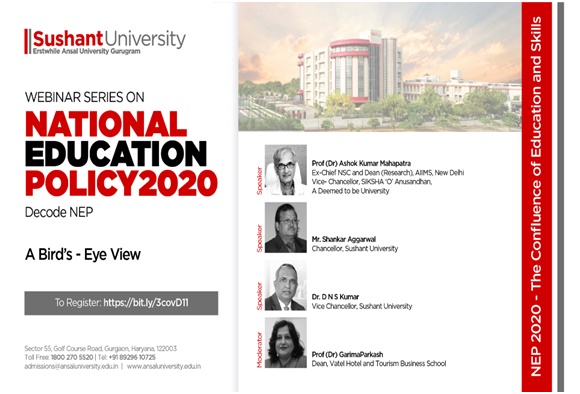
“The NEP is a Blue Ocean”
The long-awaited National Education Policy (NEP) announced recently by the Government proposes an extremely open, practical and a fast-track system of instruction and pedagogy. Sushant University, in its ongoing endeavors to keep track of the latest developments in the field of education and training, has been a forerunner in not only bringing to light the up-dated developments in this domain in the world of education but also has done its best to put them into practice.
In the first link in the chain of Webinars proposed by the Sushant university on the theme – NEP 2020 – The Confluence of Education and Skills, Sushant University invited the eminent academician Prof. Dr. A.K. Mahapatra Vice Chancellor, Shiksha O’ Anusandhaan, a deemed-to-be university to deliver the keynote address.
Dr. Shankar Aggarwal, The Honorable Chancellor of Sushant University who delivered the inaugural address delved upon the importance of education, of which, the primary motive is to disseminate knowledge and wisdom. Citing Gautam Buddha, he said the saint-teacher professed that whereas life is an amalgamation of sorrow and happiness, it is for us human beings to learn from them and to appropriately deal with them.
The pursuit of knowledge therefore must never be weakened as this is the only attempt that can make people semi-skilled, skilled and finally employable. Employability enhances the standard of living of people and contributes eventually to the country’s GDP. Comparing the systems of education in general, Dr. Aggarwal said that that Jews as a community were recognized the world over as being the ones to enforce education and, on a global level, to achieve the highest percentage of literacy. We all should learn from them. “Rigidity”, on the other hand Dr. Aggarwal regretted, emerged as the biggest impediment in putting into practice the new systems of education, especially with reference to the Indian pedagogical structure.
Dr. Mahapatra, the keynote speaker was very eloquent about the new features proposed in the NEP and termed education and health as ‘Two Pillars of the Society’. The declaration of the NEP, which is a result of profound study, research, examination and exploration in various fields, sub-fields of education at a micro level initiated by the Kothari Commission about 3 years ago, envisages a holistic, all-inclusive, real-world and a meaningful progression of the pedagogic system at the primary, secondary, under-graduate post-graduate and at research levels.
Dr. Mahapatra, having played significant roles as an instructor, an educator, a mentor, a thinker and a researcher at the All India Institute of Medical Sciences over three, decades, said that “Right to Education must go hand-in-hand with the Right to Health”. “Over the years, India has though revolutionized its education systems, opened up several schools, state and privately owned, deemed-to-be universities, transformed and upgraded its systems, brought in the latest technology and has exported specialized manpower to the world, the country still has a long way to go before finding a place in the list of the top-most countries with regard to education and training. Reminiscing about Takshashila and Nalanda as temples of knowledge, understanding and awareness, where students, pupils and disciples used to come to study from all over the world, we now are sadly being given to confront a situation wherein we see the bright students and scholars and even researchers leaving the country, desiring to pursue further studies overseas. Nevertheless, we are happy to see that it is the students of Indian origin who are creating an exclusive identity for themselves in the world and are excelling in their respective fields.
Despite having made phenomenal progress in the sphere of education, India still stands at loss with regard to delivering quality education in comparison with the way the rest of the world, especially the western countries have been able to advance themselves. Ever since independence, India has slipped down and newer economies like China have progressed by more than 10 times. Lack of infrastructure, absence of good teachers, limited access to information technology, with bungled, substandard and ruined bureaucracy are the biggest obstructions that come in the path of improvement. Such a situation is further marred with the lack of funding and not prioritizing education as the main agent of progress.
These characteristics present themselves in their most formidable aspects, especially in the state and government-run institutions which, in order to save on emoluments bill, hire teachers on a contractual basis, who, once the class finishes, consider their duty to be ‘done’. The Government-run colleges are currently not taking noticeable steps towards promoting high-level research work.
The NEP though has proposed radical, fundamental and sweeping changes in the pedagogical streams, the educational institutions at different levels still do not appear to be ready to implement them and to reap their advantages. It will be long before these benefits would see the light of the day as our approach towards studies is still book based rather than skill-based.
We all must work towards promoting research oriented multi-disciplinary universities. There should be no hard-and-fast rules about classroom learning or that of posing limitations on a simultaneous learning from a foreign university. Students who have earned credits far more than what is required to qualify for a particular course, should be allowed to use the balance credits towards learning more pursuing additional qualifications.
It is right time that we took the initial steps towards establishing a Higher education commission and education regulatory boards so that the delivery of education is closely monitored. Furthermore, India currently has too many regulatory bodies, we should try and merge them into one or two for a single-window clearance. Furthermore, just like it is done for students, a calendar for faculty development should be charted out and the academia-industry interface should be enhanced to a more frequent level.
Touching upon the subject of pandemic, the subject for which Dr. Mohapatra at the beginning of his talk regretted the loss of life of millions of people said that we must learn from this and be emerge eventually as far stronger people.
The honorable Vice Chancellor of Sushant Univesity, Dr. D.N.S. Kumar, who had the fortune of working with Dr. Kasturirangan (Awardee – Padma Shree, Padma Bhushan, Padma Vibhushan) now the chancellor of the Jawaharlal Nehru University and a great contributor towards the formation of the NEP, in his keynote address to the participants appreciated the NEP from a bird’s eye view and said that delving into the document of NEP was a tough task as we have used only the half of the 6% of GDP which was allocated for the promotion of education in our country. “NEP is a Blue Ocean and has opened several doors of knowledge and skills” said Dr. Kumar.
We have to be innovative as we cannot continue to carry on in the traditional way. We have to build and integrate, as per the NEP document, a host of liberal subjects, rather than limiting them just to developing the core subjects or the basic competencies of students. For instance, the Engineering subjects could also include economics and psychology as this will help build more capabilities and develop competencies.
As per the Prime Minister’s instructions, we all must work towards the enhancement of the Gross Enrolment ratio from the current 26 to 50.
The NEP proposes a multiple exit plan which, due to its flexibility is highly appreciated. Upon exiting after a year, the student can earn a certificate, upon two years, a Diploma, upon three years, a Degree and after 4 years a Degree of Research. The main idea is to instill and to promote skills in students and the tact to the teachers to learn, unlearn and then to re-learn. Human resources, he said are the most valuable resources and should have at their disposal a pure applied and a trans-disciplinary mode of research which should not be conducted in a silo. We all must move away from the We Only approach.
Retired people with developed and matured brains are endless depositories of knowledge should be capitalized upon and given opportunities to contribute in improving the educational design of the society. The chancellors and the vice chancellors of universities, who have a first-hand experience of dealing with the students of contemporary times should be made part of the decision making and be allowed to contribute in the policy formation.
Talking about dual-degree qualifications for students, Dr. Kumar said that the students should be allowed to pursue both online and offline courses, this will further encourage them to study and to enhance their skills.
Touching upon the flip side of the NEP, Dr. Kumar expressed his inhibitions about teachers getting the multi-dimensional skills, moving away from the education sector and starting their own enterprises. The need therefore was to train and to retain the faculty resources by making them owners and having them conduct a few certificate courses on their own
Implementing NEP, Dr. Kumar said is a monumental task, the fruits of which will be reaped in the years to come. Asked about how the NEP would increase the students’ employability, Dr. Kumar said they will get the opportunity to make themselves more competent by way of working on another degree simultaneously. “Competency and Skill are two sides of the coin, which have to go together at all costs, for which education plays a very relevant role”, said Dr. Kumar in his concluding statement.








